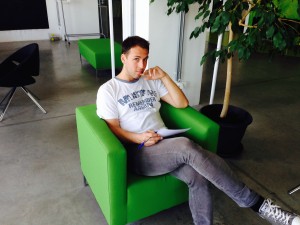Meet the 2014 Founders: SentiSquare. Helping global brands become better listeners.
The last of the 7 from 2014, SentiSquare began as an academic project by Josef Steinberger, assistant Professor at the University of West Bohemia. I caught up with Josef this week to talk about SentiSquare, a “sentiment analytics” engine that will revolutionize the way that global brands engage with their customers online and offline.
Hi Joseph, where does the idea for SentiSquare come from?
Several years ago, I started to research opinion summarization at the University of West Bohemia. There is an enormous and ever growing number of opinions about various entities all over the internet. For example, on Facebook alone, on Ford Motorcars company page, there has been over 37000 comments during the last year. And most of the comments are in English. If we include local Ford pages (ones for different countries), Twitter, LinkedIn, Youtube and various discussion forums, we end up with over 1 Million comments. I think that gathering that data and making sense of it through summarization has a great commercial potential. With the initial idea, I entered the Microsoft Innovation Centre (MIC) accelerator and the idea saw some further development. From there, I moved to the StartupYard program. Tomas and Michal, our top two NLP researchers at the university, joined me and together, with valuable advices of StartupYard mentors we further developed the idea and SentiSquare finally crystallized into a workable business idea.
Is your whole team from academia? How did you all get together on this project?
Yes, all three founders are from the University of West Bohemia. I’m an associate professor and Tomas and Michal are finishing their PhD theses. We started working on sentiment analysis together at the beginning of the year. We ran experiments for a Semeval’s shared task [an international NLP research community evaluation campaign] and we were ranked 3rd out of 30 participating teams. We joined forces for the brand-related opinion summarization project which I’d been already working on in the MIC program. Tomas brings the knowledge of semantic analysis and Michal’s expertise is in machine learning.
What will SentiSquare allow clients to do? What will its limitations be?
Sentisquare discovers the most important topics in social media content and automatically produces summaries of the topic-related comments. We can analyse millions of tweets, facebook posts, forum comments, and many other sources. It’s really the next generation of sentiment analysis. Basically, it does more than just produce sentiment polarity figures (e.g., how many times a brand was mentioned positively or negatively) but it answers the crowd sentiment question by tracking “key” opinions, e.i. opinions expressed by a large number of contributors. The trick is in identifying these opinions even when they are expressed in very different ways. These opinions drive brand reputation in a much more concrete way than “likes,” and so forthe. Sentisquare links topics across different brands, languages and periods, it will allow you to produce temporal, competitive and geographical comparisons. This will allow global companies and brands to get a good handle on their most common user complaints, the successes or drawbacks of their marketing campaigns, and their brand perceptions in a broad set of categories, for various demographics. The size of the data set limits the possibilities for the technology. If we don’t find enough relevant and content-rich comments about a brand (~1 thousand comments), the analysis won’t produce conclusive figures. To hone our models, we currently need over 1 Million domain-specific pieces of text, so this will apply to very big brands, probably with a global presence.
So you need a lot of data. what kinds of companies and people do you see as your likely customers?
Skoda [the leading Czech automaker, owned by Volkswagen Group], is a great example of a potential client. If they monitor what people are saying about the current car models, they can get inspiration on what people like, what they’d don’t like, what they want, and to which competing cars they compare Skoda’s models. This information can help in designing and marketing a new model. After the new one is out, the aggregation of the expressed sentiment about it can help in shaping the decisions taken. The power of sentiment analysis is in the fact that it goes beyond just sales figures and statistics. We can imagine this technology making the world a better place for everyone. For example, there are applications in entertainment as well. You know how Hollywood lives only on the box office take of whatever movie they release, no matter the quality of the film? Films all end up copying each other and looking pretty much the same. Plus, there’s a huge amount of risk in budgeting for a $150 Million film just because a similar one was successful. Well, what if our technology could help movie studios to understand what people like about their movies, and so allow them to *avoid* copying the things that don’t need copying. They could get ahead of trends, and really understand what the audience is yearning for before making the next film. Everybody wins.
What do you see as your primary competition in this field?
We feel that competition is a badly negotiated cooperation :laughs:. That means there is a lot of room in this market for new ideas, and new players. Even if current social media monitoring tools are nominally our competition, we’d rather position Sentisquare as a new layer on top of their functionality. We are investigating the possibility of cooperation with SocialBakers, BrandEmbassy, GoodData and eMerite, however, there are many others we would like to work with.
As an academic, what do you find most challenging about thinking in business terms, and talking to business people?
The first difference is that in business we need to think much more about the target group of users and the business benefit our solution brings. Also In research, we push the quality of the technological solutions. For example, if we improve the quality of sentiment polarity prediction by 2 percent, we could write a famous paper about it. In business, it is more about uniqueness of the idea and differentiation from the competition. Business is about practical, workable solutions that deliver, not just theoretical models.
How has your experience at StartupYard been so far? Which of the mentors has had the most powerful influence on your team and your direction as a company?
We’ve learned a lot about the business world. Now we have a good basis for pitching, business planning, marketing, sales, and positioning the company and so on. There were many mentors who gave up a valuable feedback. Jan Šedivý and Jaroslav Gergic helped us to elaborate the API strategy. Marcel Vargaeštok introduced us to what the marketing research agencies do. Adam Zbiejczuk connected us with the local social media monitoring community. Viktor Fischer share with us his knowledge about sales possibilities and company directions. And finally, there were crucial times when every positive feedback was important for us, like the one from Roman Stupka, Philip Staehelin or Jan Muehlfeit.
[ssba]






